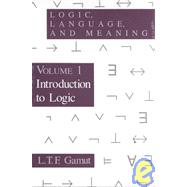
Note: Supplemental materials are not guaranteed with Rental or Used book purchases.
Purchase Benefits
Looking to rent a book? Rent Logic, Language, and Meaning [ISBN: 9780226280851] for the semester, quarter, and short term or search our site for other textbooks by Gamut, L. T. F.. Renting a textbook can save you up to 90% from the cost of buying.
| Foreword | |
| Preface | |
| Introduction | |
| Arguments, Valid Arguments, and Argument Schemata | |
| Logic and Meaning | |
| Logical Constants and Logical Systems | |
| Logic and Linguistics before the Twentieth Century | |
| The Twentieth Century | |
| Logical Form versus Grammatical Form | |
| Ordinary Language Philosophy | |
| Linguistics and Philosophy | |
| Formal Languages | |
| Propositional Logic | |
| Truth-Functional Connectives | |
| Connectives and Truth Tables | |
| Formulas | |
| Functions | |
| The Semantics of Propositional Logic | |
| Truth Functions | |
| Coordinating and Subordinating Connectives | |
| Predicate Logic | |
| Atomic Setences | |
| Quantifying Expressions: Quantifiers | |
| Formulas | |
| Some More Quantifying Expressions and Their Translations | |
| Sets | |
| The Semantics of Predicate Logic | |
| Interpretation Functions | |
| Interpretation by Substitution | |
| Interpretation by Means of Assignments | |
| Universal Validity | |
| Rules | |
| Identity | |
| Some Properties of Relations | |
| Function Symbols | |
| Arguments and Inferences | |
| Arguments and Argument Schemata | |
| Semantic Inference Relations | |
| Semantic Validity | |
| The Principle of Extensionality | |
| Natural Deduction: A Syntactic Approach to Inference | |
| Introduction and Elimination Rules | |
| Conjunction | |
| Implication | |
| Disjunction | |
| Negation | |
| Quantifiers | |
| Rules | |
| Soundness and Completeness | |
| Beyond Standard Logic | |
| Introduction | |
| Definite Descriptions | |
| Restricted Quantification: Many-Sorted Predicate Logic | |
| Second-Order Logic | |
| Many-Valued Logic | |
| Introduction | |
| Three-Valued Logical Systems | |
| Three-Valued Logics and the Semantic Notion of Presupposition | |
| Logical Systems with More than Three Values | |
| Four-Valued Logics and the Semantic Notion of Presupposition | |
| The Limits of Many-Valued Logics in the Analysis of Presupposition | |
| Elimination of Variables | |
| Pragmatics: Meaning and Usage | |
| Non-Truth-Conditional Aspects of Meaning | |
| Logical Conjunction and Word Order | |
| Usage and the Cooperation Principle | |
| Inclusive and Exclusive Disjunction | |
| Disjunctions and Informativeness | |
| Conversational Maxims and Conversational Implicatures | |
| The Controversial Implicatures of Disjunctions | |
| Implication and Informativeness | |
| Presuppositions and Conversational Implicatures | |
| Conventional Implicatures, Presuppositions, and Implications | |
| Formal Syntax | |
| The Hierarchy of Rewrite Rules | |
| Grammars and Automata | |
| The Theory of Formal Languages | |
| Grammatical Complexity of Natural Languages | |
| Grammars, Automata, and Logic Solutions to Exercises | |
| Bibliographical | |
| Notes | |
| References | |
| Index | |
| Table of Contents provided by Publisher. All Rights Reserved. |
The New copy of this book will include any supplemental materials advertised. Please check the title of the book to determine if it should include any access cards, study guides, lab manuals, CDs, etc.
The Used, Rental and eBook copies of this book are not guaranteed to include any supplemental materials. Typically, only the book itself is included. This is true even if the title states it includes any access cards, study guides, lab manuals, CDs, etc.